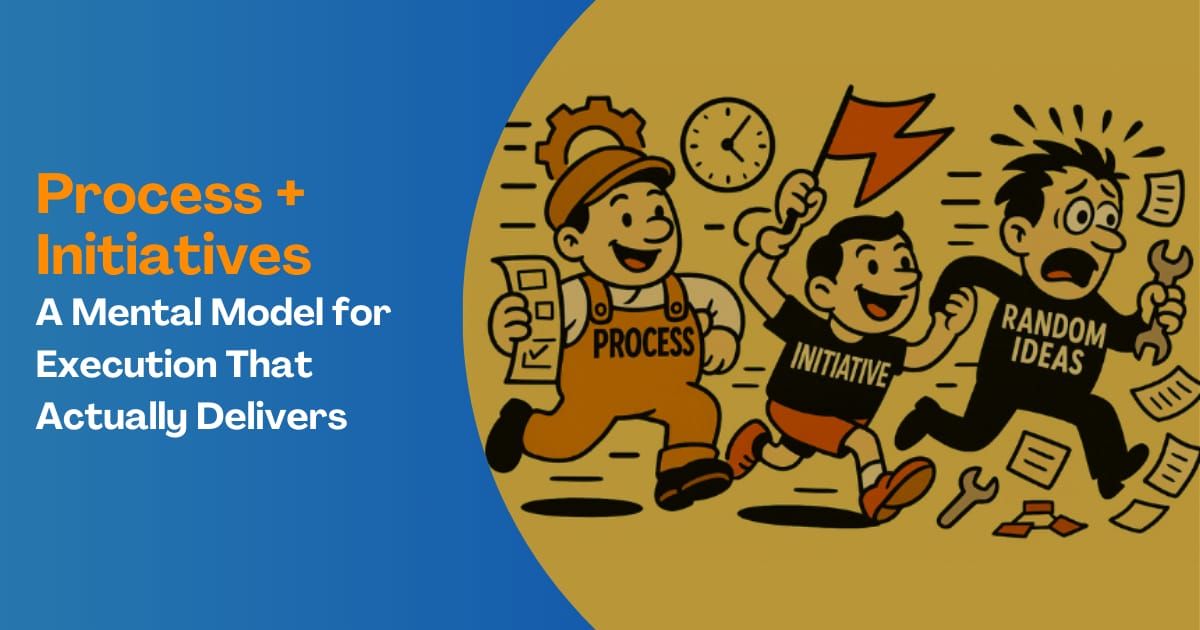
Over the years, one thing has become clear to me: ideas are cheap. Execution is everything.
As a founder, I’ve led product, marketing, sales, ops, and team building — and one mental model helps me get unstuck and drive consistent progress in any function:
Every result comes from two components:
A process
A set of initiatives that run within or around that process**
This might sound simple, but it’s powerful. Here's how I think about it:
A process is your repeatable system — your engine.
An initiative is a focused, time-bound bet — an accelerator, often experimental.
Each process can (and should) host multiple initiatives to evolve, unblock, or optimize performance.
This model works in nearly every team. Let me show you how.
1. Sales: System + Smart Bets
When we moved to BANT-based qualification and added structured outbound stages, we finally had a sales process that was trackable. But the real growth came when we started layering initiatives within that process.
Examples of initiatives we’ve tried:
A time-bound test targeting HR leaders in upskilling cohorts
Rewriting outbound emails based on highest-converting content themes
Adding AI-powered lead scoring to prioritize ICP leads faster
Each of these didn’t replace the sales process — they plugged into it to improve it.
Process = structure.
Initiatives = velocity.
Together, they compound.
2. Marketing: From Rhythm to Impact
Our baseline marketing process includes organic content, weekly posts, and monthly email campaigns. That rhythm builds consistency. But we’ve never seen breakthroughs without initiatives like:
Running co-marketing partnerships with creators in the job/creator economy
Launching SEO experiments to rank job boards on long-tail intent
Repurposing founder podcasts into short reels for paid retargeting
Some worked. Some didn’t. But all taught us something.
Marketing without a process is chaos.
Marketing without initiatives is just maintenance.
3. People Ops: Beyond HR Checklists
Hiring, onboarding, reviews — all of these are processes in any startup. But when morale dips or communication breaks down, no process alone can fix that. That’s when you need initiatives.
Ones that have worked well for us:
Monthly “State of the Company” calls to bring transparency
Async team highlights in Notion (instead of all-hands)
Peer-to-peer learning pods across functions (a mini skilling-up experiment)
Each time we tried something like this, it helped improve trust, velocity, or belonging — all without needing a re-org or a culture manifesto.
Processes are how people operate.
Initiatives are how people grow.
Why This Model Helps
When I’m stuck, overwhelmed, or unsure what’s not working, I ask myself:
Is this a broken or missing process?
Or do I need to introduce a fresh initiative to spark movement?
This lens has helped me:
Avoid building new systems for every problem
Keep my team focused on execution instead of chasing new shiny ideas
Track progress better by separating “ongoing” vs “time-bound” efforts
It also creates clarity during planning. Every quarter, we now define:
What are our core processes across teams?
What are the 3–5 high-leverage initiatives we’ll run within those?
That’s it. No jargon. No 50-slide OKR decks.
Apply This to Anything You’re Building
Whether you’re:
A solo creator launching a newsletter
A startup founder scaling ops
A team leader improving retention
You can ask:
What’s my repeatable process?
What initiatives can I launch this month to evolve it?
The results will follow.
TL;DR
Process = the engine
Initiatives = the upgrades
You need both
Each process can host multiple initiatives over time
Think of it like this:
Your company runs on engines.
But breakthroughs happen when you fuel them with smart, small bets.
Got a process or initiative you’re trying out? Tag me or reply to this post with #PankitsPOV — I’d love to learn from your experiments too.

